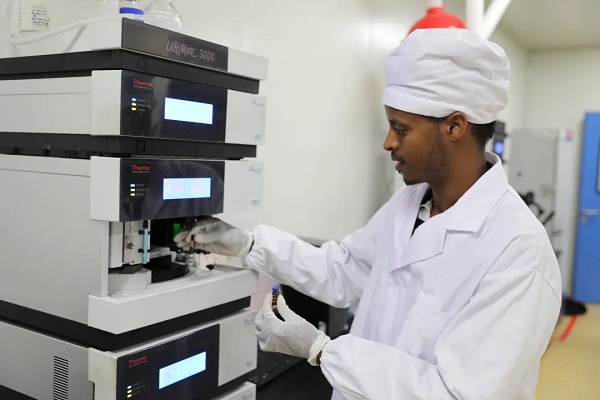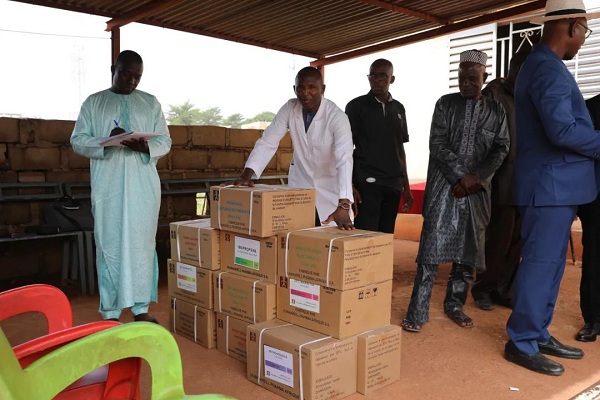OVC firm facilitates localized medical supplies in Africa

A worker at Humanwell's workshop in Ethiopia. [Photo/WeChat account of Optics Valley of China]
Mali, a West African country at the southern end of the Sahara Desert, remains scorching hot in late October. As one of the world's least-developed nations, Mali had next to no pharmaceutical manufacturing industries a decade ago, with diseases running rampant.
Having leveraged the Belt and Road Initiative (BRI), Humanwell Healthcare Group Co, a leading pharmaceutical company from the East Lake High-tech Development Zone (also known as Optics Valley of China, or OVC) in Wuhan, Hubei province, invested in building a factory in Mali in 2013.
In 2015, it was completed and put into operation, becoming the first local pharmaceutical factory in the country and the first high-standard modern pharmaceutical factory in West Africa.
Since then, Mali has ceased to rely on imported drugs. Humanwell has kept expanding its overseas business, with more than 80 products exported to over 70 countries and regions worldwide.
In 2022, the company's global revenue reached 2.555 billion yuan, a year-on-year increase of 13.59 percent.
Building a factory in Mali was no mean feat. At that time, Mali, along with other West African countries, almost entirely relied on imported drugs, which were often prohibitively expensive.
Some basic drugs were not profitable for pharmaceutical companies to import and were often in short supply. This led to a shortage of medical supplies, with a lack of adequate medication being the norm for the public.
"I was so uncomfortable at seeing that the local people here couldn't afford basic medicines or even intravenous fluids. We are a pharmaceutical company, so we have to ensure they have access to essential drugs," said Li Wensheng, chairman of Humanwell (Africa) Pharmaceuticals.
The company's modern, clean and tidy workshops in Mali feature high-speed running equipment, and staff members following standardized procedures. The design, construction, and production technology of the workshops all meet domestic standards.
Former Mali president Ibrahim Boubacar Keita once said, "This Chinese pharmaceutical factory has put an end to Mali's history of not being able to produce drugs, benefiting the people of Mali."

Humanwell donates medical supplies to African clinics. [Photo/WeChat account of Optics Valley of China]
In 2018, Humanwell (Ethiopia) Pharmaceuticals was completed and put into operation, producing small-volume injections, oral liquids, tablets, and capsules.
Meanwhile, Ethiopia's economy is slightly better off than Mali's, but the share of its pharmaceutical market held by domestic companies is less than 8 percent.
However in recent years, many companies have developed localized drugs, such as anti-inflammatory drugs, gastrointestinal drugs, and psychoactive drugs. There are now 87 types of locally produced drugs, sharply cutting the rate of imported medicines in Ethiopia.
In September, the Ethiopian Pharmaceutical Supply Services Agency awarded Humanwell Ethiopia Pharmaceuticals the "Best Supplier" award.
Over the past decade, Humanwell's business revenue in Africa swelled to nearly 400 million ($55.76 million) yuan, and it continues on an upward trajectory.


